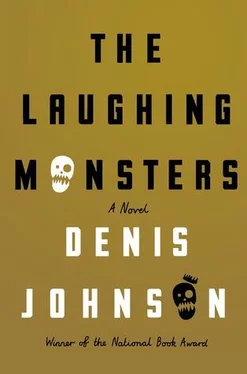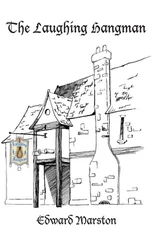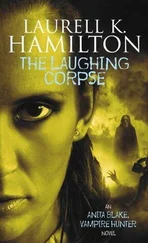“I am El Olam — the Everlasting God!”
They’ve stopped everything. He’s catching his breath. Listen, Davidia — his face frightens me. The blade is twitching in his hands.
She laughs at him.
I need water and I’m going out now before Michael kills her.
[OCT 27 ca. 5:30PM]
The sun is low and very red and mean. I can’t look west.
Down to double digits: 94 hours to go. Plus 30 minutes. Still 5000 KM to cover.
I’ve drunk my fill at the creek. No matter. The toxins work slowly. Thirst would have killed me by tomorrow. I’m resting beside the creek among some new associates, that is, four skeletal sad-eyed Brahma cattle and the three herdsmen who tend them. Later I’ll tell you all about these guys. I don’t intend to move from this haven, I’m at my leisure to write and also to drink, and not just water, and I’ll tell you all about that too, but first — as to this morning’s romp—
When I came out of my hiding-hut, Michael was declaring again:
“I’ll destroy this place!” With a sweep of his machete he said, “You people are crazy!”
I stood by my doorway till Michael noticed. At first he didn’t, but the villagers watched me. Without the usual smiling and laughing, their mouths took up no room in their faces and their eyes seemed abnormally huge.
The sight of me slapped Michael awake. His recognition of me seemed to travel up from his feet and when it got to his face I came closer, but not in reach of the machete.
He looked around himself: a dozen or so huts; the one tree — deceased; two piles of red dirt; two purple coffins, and a hole; also his clansmen huddling together on the ground like survivors of a shipwreck.
He said: “Where is she?” He meant you, Davidia.
“The Americans had us,” I said. “Your outfit, the Tenth.”
“Where is she, Nair?”
“She’s gone. She got on a chopper and didn’t look back.”
His spine withered. The weapon dangled at his side. “Sometime during Arua, she took her heart away from me. I felt it. In Arua, something happened.”
I wanted to take him away from this scene and talk about that other scene, about you, Davidia, and the colonel and the prop-wash and the noisy cloud that ate you up.
However: the Dolce woman strode up to my face and gave out a hearty, phony laugh and cried, “God knocked backwards!”
Michael said, “This woman is insane.”
I said, “You must be La Dolce.”
She yelped, “You’ve got an English for us!!??” (I punctuate excessively because her manner came straight out of comic books. She communicated in yelps, whoops — what else — guffaws, huzzahs, preachments, manifestos — and I had to agree instantly with Michael that she was insane.) “You are right, because I am!!! — I AM LA DOLCE!!!”
“What a stupid name to call yourself,” Michael said.
She raised her face to Heaven and sang ha-hah.
“I understand she’s the village queen or something.”
“More than that. She’s a priestess of genocide.”
La Dolce addressed her brethren, pointing at Michael’s head. “Do you hear the Devil talking in his mouth?”
“She calls me her prisoner,” Michael said. “She tells them I’m being kept here by her power.”
“She speaks good English.”
“She’s from Uganda. She’s the cousin of my uncle.”
La Dolce pointed at me now, almost touching my nose: “This one’s clan is called Bong-ko. Their lies make you laugh!!!”
Michael said, “They know the truth about you.” I said What? — he said, “Aren’t you a liar? Why are you here without Davidia? If the Tenth got hold of you, how did you get away? Did you sell me for your freedom? How long before they come for me?” He raised high the machete. “I feel like cutting the lies right out of you!”
The blade didn’t scare me so much — only the look of him. His beard was growing out in streaks and whorls. Nappy head, red eyes, fat parched lips. He’d plastered the laceration on his forearm with red mud. His greasy black face, his mangled sweatshirt, his mistreated jeans — all dabbed and smeared with it. His sandals and feet were tainted with the same African muck.
“Michael. Lower your weapon. I need water.”
“I can’t help you. Do you see her crazy eyes?” La Dolce sat in her wooden chair like an enormous toddler, broadcasting happy rage. “This woman is calling for a sacrifice. She wants to bury someone alive. If I don’t keep an eye on her, she’ll throw one of these people into the grave.”
“Has she got more bottled water?”
“She’s got a whole commissary.”
“Where? — Please.”
“Die of thirst, Nair. You sold me to the machine.”
“I’ve got no time for your accusations.”
“You should be the one to go in the grave with those children.”
“Lower your weapon and help your friend.”
“Sacrifice for sacrifice.”
“Two things,” I said, backing away. “First, water. And then we get out of here.” I guess I looked stupid, stumbling off. And he looked stupid with his cutlass in the air, as if it was stuck there and he couldn’t get it down.
I poked my head into several huts and found one stacked with half a dozen cases of bottled water and boxes of cereal and canned goods, its entrance guarded by a man leaning on a hoe. He took it up like a cudgel when I got near. I tried to bribe him with all my Ugandan shillings, then with US dollars — twenty, a hundred, two hundred — but he wouldn’t share.
I experienced a sort of dislocation here. The next several minutes have gotten away from me, and I’m not sure I remember things in their actual order.
I saw the villagers all standing around the grave, shuffling their feet in place as they moaned and trembled. They were dancing. Singing.
La Dolce and Michael had resumed their own dance, circling the scene.
I didn’t notice that the purple coffins had gone until they reappeared on the shoulders of four men coming two-by-two from behind me. The dead children, I assumed, traveled inside them. The crowd made way, still chanting and moving in a zombie trance.
The diggers waited in their hole and each coffin was just shoved over into their double embrace and let down to the floor with a little sploosh, and then helping hands raised one of the men from his work, while the other simply stepped onto one of the coffins and clambered out on his own, leaving behind the smeary impression of his bare foot.
La Dolce screamed at some length, and Michael spoke briefly in a much lower tone, both in Lugbara, I supposed.
The mob circled the grave on their knees, shoving dirt into it with their hands. They tossed the piles back into the holes and then bowed their heads while their queen made a speech that included much repetition of “La Dolce, La Dolce.” When she got near me, she took up her theme in English: “What is that name? I am La Dolce Vita!! You know it means that life is sweet. That’s me. I bring life. Life is sweet. But first we must sacrifice. First God will take what he wants. He takes the babies into his jaws. Can we stop him?” She went among the crowd, looking into face after face, bending close: “Can you stop God? — Can you stop God? What about you? — Can you stop God? No!! You cannot!!! And now God is angry that you have not sacrificed. I know this because I am God!” I doubt they comprehended.
Michael said to her, “The Newada people are not animists and sacrificers like that. This village used to be Christian”—he pronounced it Chrishen. Then he shouted, still in English:
“Go home! The grave is full enough! Go home!”
Many of the mob stood up and wandered away. Some of them wept, nobody talked. A dozen or so stayed with their queen.
La Dolce watched the others go, and I got the sense that Michael had triumphed here.
Читать дальше












